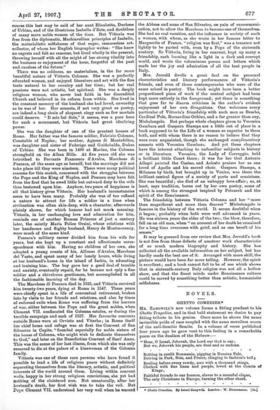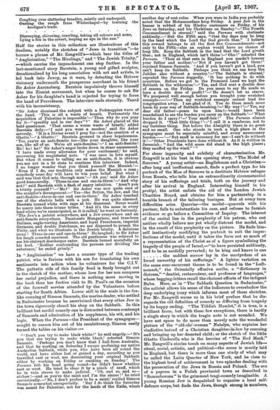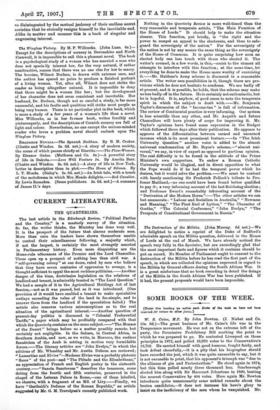NOVELS.
GHETTO COMEDIES.•
Ma. ZANOWILL'S new volume forms a fitting pendant to his Ghetto Tragedies, and in that bald statement we desire to pay fitting tribute to his genius. Once more he shows the same invincible pride of race coupled with the same merciless scorn of the anti-Semitic Semite. In a volume of verse published four years ago be gave vent to this feeling in a remarkable poem on the dualism of the Hebrew:— "Hear, 0 Israel, Jehovah, the Lord our God is one; But we, Jehovah'his people, are dual and so undone.
Rotting in sunlit Roumania, pigging in Russian Pale, Driving in Park, Bois, and Prater, clinging to fashion's tail / Reeling before every rowdy, sore with a thousand stings, Clothed with fine linen and purple, loved at the Courts of Kings; Faithful friends to our foemon, slaves to a scornful clique, The only Christians in Europe, turning the other cheek.
• Metre Comae& By Israel Langnill. London : W. Heineman. [Cal
Coughing over clattering treadles, saintly and underpaid, Ousting the rough from Whitechapel—by learning the hooligan's trade.
Blarneying, shivering, crawling, taking all colours and none, Lying a fox in the covert, leaping an ape in the sun."
Half the stories in this collection are illustrations of this dualism, notably the sketches of " Jews in transition "—to borrow a phrase of Mr. Zangwill's—which bear the titles of "Anglicization," "The Hirelings," and " The Jewish Trinity," —which carries the impeachment one step further. In the last-mentioned story Berstein, a young and gifted sculptor, denationalised by his long association with art and artists, is led back into Jewry, as it were, by detecting the Hebrew visionary underneath the prosperous merchant in his friend Sir Asher Aaronsberg. Berstein impulsively throws himself into the Zionist movement, but when he comes to ask Sir Asher for his daughter's hand is rejected for trying to force the band of Providence. The interview ends stormily. Taxed with his inconsistency,
"Sir Asher dismissed the subject with a Podsnappian wave of the hand. This is all a waste of breath. Fortunately the acquisition of Palestine is impossible.'—' Then why do you pray for it—"speedily and in our days" ? ' Sir Asher glared at the bold questioner. ' That seems a worse waste of breath,' added Berstein drily. ' I said you were a mocker; said Sir Asher severely. It is a Divine event I pray for—not the creation of a Ghetto.'—' A Ghetto !' Berstein groaned in sheer hopelessness. ' Yes, you're an anti-Semite too—like your daughter, like your son, like all of us. We're all anti-Semites.'= I an anti-Semite ! Ho! ho ! ho ! ' Sir Asher's anger broke down in sheer amusement.
• I have made every allowance for your excitement,' he said,
recovering his magisterial note. was once in love myself. But when it comes to calling me an anti-Semite, it is obvious you are not in a St state to continue this interview. Indeed, I no longer wonder that you think yourself the Messiah.'- ' Even if I do, our tradition only makes the Messiah a man ; somebody some day will have to win your belief. But what I said was that God acts through man.'—' Ah yes,' said Sir Asher good-humouredly. • Three-in-one and one-in-three.'—' And why not?' said Berstein with a flash of angry intuition. Aren't you a trinity yourself ? '= Me ? ' Sir Asher was now quite sure of the sculptor's derangement.= Yes—the Briton, the Jew, and the anti-Semite—three-in-one and one-in-three.' Sir Asher touched one of the electric bells with a jerk. He was quite alarmed. Berstein turned white with rage at his dismissal. Never would he marry into these triune tribes. And it's the same in every land where we're emancipated, as it is called,' he went on furiously.
• The Jew's a patriot everywhere, and a Jew everywhere and an anti-Semite everywhere. Passionate Hungarians, and true-born Italians, eagle-waving Americans, and loyal Frenchmen, imperial Germans, and double Dutchmen, we are dispersed to preach the Unity, and what we illustrate is the Jewish trinity. A delicious irony ! Three-in-one and one-in-three.' He laughed ; to Sir Asher his laugh sounded maniacal. The old gentleman was relieved to see his stalwart doorkeeper enter. Berstein turned scornfully on his heel. Neither confounding the persona nor dividing the substance,' he ended grimly."
In " Anglicization " we have a coarser type of the trading patriot. who is furious with his son for translating his own sentiments into action when he volunteers for the C.I.V. The pathetic side of this family fend is finely brought out in the sketch of the mother, whose love for her son conquers her racial „prejudice, and there is nothing more moving in the book than her furtive visit to St. Paul's on the occasion of the farewell service attended by the Volunteers before starting for South Africa. Lower still in the scale is the fox- like cunning of Simeon Samuels, the marine dealer, who settled in Sudminster because he ascertained that every other Jew in the town rigorously closed his shop on the Sabbath. In this brilliant but sordid comedy one is distracted between contempt of Samuels and admiration of his suppleness, his wit, and his logic. When the Parnass—the President of the synagogue— sought to reason him out of his recalcitrancy, Simeon easily turned the tables on his visitor :— ".Don't you try to make black white !' he said angrily.= It's you that are trying to make white black,' retorted Simeon Samuels. Perhaps you don't know that I hail from Australia, and that by working on Saturday I escape n my native Australian Sabbath, while you, who have been all round the world, and have either lost or gained a day, according as you travelled east or west, are desecrating your original Sabbath either by working on Friday or smoking on Sunday.' The Parnass felt his head going round—he didn't know whether east or-west. He tried to clear it by a pinch of snuff, which ho in vain strove to make judicial. • Oh, and so, and so- atchew !—and so you're the saint and I'm the sinner !' he cried sarcastically.' No, I don't profess to be a saint,' replied Simeon Serape's somewhat unexpectedly. Bnt I do think the Saturday .was meant for Palestine, not for the lands of the Exile, where another day of rest rules. When you were in India you probably noted that the Mohammedans keep Friday. A poor Jew in the bazaar is robbed of hie Hindoo customers on Friday, of his Jews on Saturday, and his Christians on Sunday.'—' The Fourth Commandment is eternal!' said the Farness with obstinate sublimity .= But the Fifth says, " that thy days may be long in the land which the Lord thy God giveth thee." I believe this reward belongs to all the first five Commandments—not only to the Fifth—else an orphan would have no chance of long life. Keep the Sabbath in the land that the Lord giveth thee ; not in England, which isn't thine.'—' Oho !' retorted the Farness. ' Then at that rate in England you needn't honour your father and mother.'—'Not if you haven't got them !' rejoined Simeon Samuels. And if you haven't got a land, you can't keep its Sabbath. Perhaps you think we can keep the Jubilee also without a country.'—' The Sabbath is eternal,' repeated the Parnass doggedly. 'It has nothing to do with countries. Before we got to the Promised Land we kept the Sabbath in the wilderness.'—' Yes, and God sent a double dose of manna on the Friday. Do you mean to say He sends us here a double dose of profit?'—' He doesn't let us starve. We prospered well enough before you brought your wretched example—'—' Then my wretched example cannot lead the congregation away. I am glad of it. You do them much more harm by your way of Sabbath-breaking.'—' My way !'—• Yes, my dear old father—peace be upon him!—would have been scandalized to see the burden you carry on the Sabbath.'—' What burden do I carry P'—' Your snuff-box ! ' The Parnass almost dropped it. 'That little thing !'—' I call it a cumbrous, not to say tasteless thing. But before the Almighty there is no great and no small. One who stands in such a high place in the synagogue must be especially mindful, and every unnecessary burden—'—' But snuff is necessary for me—I can't do without it.'—` Other Presidents have done without it. As it is written in Jeremiah "And the wild asses did stand in the high places; they snuffed up the wind." " For sheer ingenuity and subtlety of characterisation Mr. Zangwill is at his best in the opening story, " The Model of Sorrows" A young artist—an Englishman and a Christian— after long and ineffectual search, finds a perfect type for his portrait of the Man of Sorrows in a destitute Hebrew refugee from Russia, who tells him an extraordinarily circumstantial story of his sufferings and trials, both on the journey and after his arrival in England. Interesting himself in his proigge, the artist enlists the aid of the London Jewish Charities Board, and obtains for him a partnership in a humble branch of the tailoring busily ss. But at every turn difficulties arise. Quarriar—the model—quarrels with his partner, fails to substantiate his case, and refuses to furnish evidence or go before a Committee of Inquiry. The interest of the recital lies in the perplexity of his patron, who cad neither wholly believe nor yet wholly distrust the model, and in the result of this perplexity on the picture. He finds him- self instinctively modifying the portrait to suit the imper- fections of the model, until it takes the form not so much of a representation of the Christ as of a figure symbolising the tragedy of the people of Israel,—" to have persisted sublimely, and to be as sordidly perverted ; to be king and knave in one the saddest sorrow lay in the martyrdom of an Israel unworthy of his sufferings." A lighter variation on the same ever-recurrent theme is to be found in the "Luft- mensal]," the Orientally effusive scribe, a "dictionary in distress," "dentist, restaurateur, and professor of languages," whose begging-letters recall the choicest efforts of the indigent Balm. Here, as in " The Sabbath Question in Sadminster," the satirist allows his sense of the ludicrous to overshadow the deep underlying irony which informs most of these sketches. For Mr. Zangwill warns us in his brief preface that he die- regards the old definition of comedy as differing from tragedy by its happy ending. " The Yiddish Hamlet," it is true, is a brilliant farce; but with these few exceptions, there is hardly a single story in which the tragic note is not sounded. We have not space to do more than merely note the wonderful picture of the " old-olo'-woman" Natalya, who expiates her vindictive hatred of a Christian daughter-in-law by rescuing and bringing up her deserted child; or the sketch of the little Ghetto Cinderella who is the heroine of " The Red Mark." Mr. Zangwill's stories touch on many aspects of Jewish life— ritual, social, artistic, and political—the scene is mostly laid in England, but there is more than one study of what may be called the Latin Quarter of New York, and he rises to the highest level of achievement in two episodes dealing with the persecution of the Jews in Russia and Poland. The eve of a pogrom in a Polish provincial town as described in " Samooborona" is the grimmest tragi-comedy imaginable. A young Russian Jew is despatched to organise a local self- defence corps, but finds the Jews, though strong in numbers,
so disintegrated by the mutual jealousy of their endless secret societies that he stoically resigns himself to the inevitable end. Alike in matter and manner this is a book of singular and engrossing interest.




























































 Previous page
Previous page